
Seven Samurai is a 1954 Japanese epic samurai action film co-written, edited, and directed by Akira Kurosawa. Taking place in 1586 in the Sengoku period of Japanese history, it follows the story of a village of desperate farmers who seek to hire samurai to combat bandits who will return after the harvest to steal their crops.

Sunrise: A Song of Two Humans is a 1927 American synchronized sound romantic drama directed by German director F. W. Murnau and starring George O'Brien, Janet Gaynor, and Margaret Livingston. While the film has no audible dialog, it was released with a synchronized musical score with sound effects using the Movietone sound-on-film process. The story was adapted by Carl Mayer from the short story "The Excursion to Tilsit", from the 1917 collection with the same title by Hermann Sudermann.

Kill Bill: Volume 1 is a 2003 American martial arts film written and directed by Quentin Tarantino. It stars Uma Thurman as the Bride, who swears revenge on a group of assassins and their leader, Bill, after they try to kill her and her unborn child. Her journey takes her to Tokyo, where she battles the yakuza.
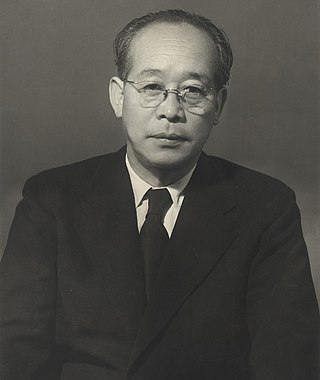
Kenji Mizoguchi was a Japanese filmmaker who directed roughly one hundred films during his career between 1923 and 1956. His most acclaimed works include The Story of the Last Chrysanthemums (1939), The Life of Oharu (1952), Ugetsu (1953), and Sansho the Bailiff (1954), with the latter three all being awarded at the Venice International Film Festival. A recurring theme of his films was the oppression of women in historical and contemporary Japan. Together with Akira Kurosawa and Yasujirō Ozu, Mizoguchi is seen as a representative of the "golden age" of Japanese cinema.

The Criterion Collection, Inc. is an American home-video distribution company that focuses on licensing, restoring and distributing "important classic and contemporary films". Criterion serves film and media scholars, cinephiles and public and academic libraries. Criterion has helped to standardize certain aspects of home-video releases such as film restoration, the letterboxing format for widescreen films and the inclusion of bonus features such as scholarly essays and documentary content about the films and filmmakers. Criterion most notably pioneered the use of commentary tracks. Criterion has produced and distributed more than 1,000 special editions of its films in VHS, Betamax, LaserDisc, DVD, Blu-ray and Ultra HD Blu-ray formats and box sets. These films and their special features are also available via The Criterion Channel, an online streaming service that the company operates.

Dragon Inn is a 1967 Taiwanese wuxia film written and directed by King Hu. The film was remade in 1992, as New Dragon Gate Inn, and again in 2011 as Flying Swords of Dragon Gate.
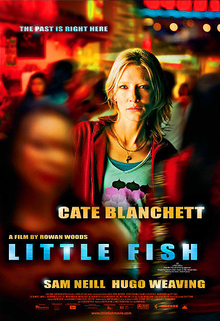
Little Fish is a 2005 Australian film directed by Rowan Woods and written by Jacquelin Perske. Starring Cate Blanchett, Hugo Weaving, and Sam Neill, the film is about a heroin addict who is desperately trying to escape her past to achieve her goals. It was developed and produced by Vincent Sheehan and Liz Watts of Porchlight Films, with Cate Blanchett and her husband Andrew Upton's production company Dirty Films receiving an Associate Producer credit.
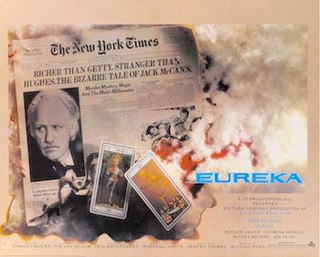
Eureka is a 1983 psychological drama film directed by Nicolas Roeg, and starring Gene Hackman, Rutger Hauer, Theresa Russell, Mickey Rourke, and Joe Pesci. It follows the life of a Klondike prospector who becomes one of the world's wealthiest men after striking gold in 1925, but, 20 years on, fears that he is being preyed upon by his daughter and her social-climbing husband, as well as a mobster attempting to usurp the Caribbean island he owns. The screenplay is loosely based on the unsolved murder of Sir Harry Oakes in the Bahamas in 1943.
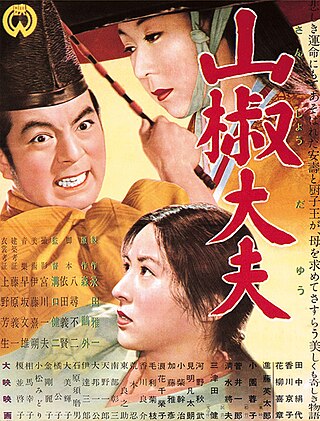
Sansho the Bailiff is a 1954 Japanese period film directed by Kenji Mizoguchi based on a 1915 short story of the same name by Mori Ōgai, which in turn was based on a sekkyō-bushi appearing in written form in the 17th century. It follows two aristocratic children who are sold into slavery.

A Touch of Zen is a 1971 wuxia film written, co-edited and directed by King Hu. Its screenplay is based on a classic Chinese story "Xianü" in the book Strange Stories from a Chinese Studio by Pu Songling. The film is set in the Ming dynasty under the dominance of eunuchs and explores a variety of themes including the transcendence of dichotomies, Zen Buddhism, feminism, conservative female roles, and the ghost story.

Arrow Films is a British independent film distributor and restorer specialising in world cinema, arthouse, horror and classic films. As Arrow Video, it sells Ultra HD Blu-rays, Blu-rays and DVDs online; it also operates its own subscription video on-demand service, Arrow Player. Since 2017 Arrow have had a dedicated podcast hosted by film-makers Sam Ashurst and Dan Martin. Arrow Video is considered a boutique Blu-ray label.
Maitland McDonagh is an American film critic, writer-editor and podcaster. She is the author of Broken Mirrors/Broken Minds: The Dark Dreams of Dario Argento (1991) and other books and articles on horror and exploitation films, as well as about erotic fiction and erotic cinema. In 2022, McDonagh was inducted into the Rondo Hatton Classic Horror Awards' Monster Kid Hall of Fame. She is the founder of the small press 120 Days Books, which became an imprint of Riverdale Avenue Books.

Raining in the Mountain is a 1979 film written and directed by King Hu. The film was selected as the Hong Kong entry for the Best Foreign Language Film at the 52nd Academy Awards, but was not accepted as a nominee.

Throw Down is a 2004 Hong Kong martial arts film directed by Johnnie To and starring Louis Koo, Aaron Kwok, Cherrie Ying, and Tony Leung Ka-fai. To dedicated the film to the late Japanese filmmaker Akira Kurosawa and, in making it, had drawn upon elements of Kurosawa's debut feature, Sanshiro Sugata. Throw Down had its premiere at the 61st Venice International Film Festival.

New Line Home Entertainment was the home entertainment distribution arm of the film production studio of the same name, founded in 1990. According to New Line's website, Misery was the first New Line Home Video release.

Pixar Short Films Collection, Volume 1 is a home video compilation released by Walt Disney Home Entertainment on November 6, 2007, containing 13 of Pixar's short films. It was followed by Pixar Short Films Collection, Volume 2, which was released on November 6, 2012, and Pixar Short Films Collection, Volume 3, which was released on November 6, 2018.

The Alloy Orchestra was a musical ensemble based in Cambridge, Massachusetts, United States. It performed its own accompaniments to silent films of the classic movie era on an unusual collection of found objects, homemade instruments, accordion, clarinet, musical saw, and a sampling synthesizer, the group scored and performed with 40 feature-length silent films or collections of shorts. The group is often credited with having helped revitalize the art of silent film accompaniment.
The Warner Archive Collection is a home video division for releasing classic and cult films from Warner Bros.' library. It started as a manufactured-on-demand (MOD) DVD series by Warner Bros. Home Entertainment on March 23, 2009, with the intention of putting previously unreleased catalog films on DVD for the first time. In November 2012, Warner expanded the Archive Collection to include Blu-ray releases, Some Warner Archive releases, such as Wise Guys, previously had a pressed DVD release but have lapsed out of print and have since been re-released as part of the Warner Archive collection.
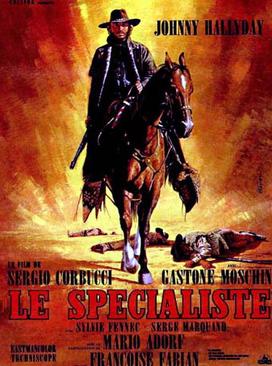
The Specialists is a 1969 Spaghetti Western co-written and directed by Sergio Corbucci. It was an international co-production between Italy, France and West Germany. Retrospective critics and scholars of Corbucci's Westerns have deemed The Specialists to be the final film in the director's "Mud and Blood" trilogy, which also includes Django (1966) and The Great Silence (1968).

Lupin the Third: The Woman Called Fujiko Mine is a Japanese anime television series produced by TMS Entertainment. Part of the Lupin III franchise, it is the fourth anime television adaptation of the Lupin III manga series created by Monkey Punch. Directed by Sayo Yamamoto, it aired on Nippon TV from April to June 2012. It focuses on the franchise's heroine, Fujiko Mine, as she undergoes various missions and encounters the rest of the Lupin III cast for the first time. Unlike the franchise's previous three televised anime, The Woman Called Fujiko Mine is more sexually oriented in order to capture the "sensuality" present in the original manga, as well as darker and more serious. It is also the only installment in the franchise to be directed by a woman and the first in which Lupin III is not the protagonist.

















